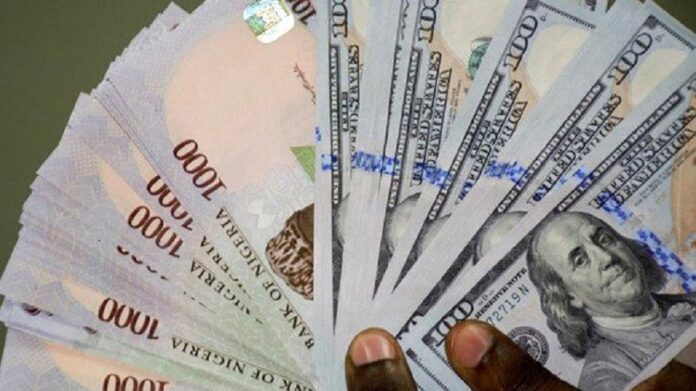Nigerian analysts are hopeful that if the Naira’s value growth versus the dollar continues, it might result in a sharp decline in the cost of imported products and, consequently, the nation’s headline inflation rate, which was 33.88 percent in October 2024.
This was revealed in separate interviews on Monday by Prof. Godwin Oyedokun, a don at Lead City University in Ibadan, and Gbolade Idakolo, the CEO of SD & D Capital Management.
As the Naira settled at N1,538.50 per dollar on Monday, December 9, 2024, after trading at N1,740 on November 9 of the same year, Idakolo and Oyedokun stated.
When compared to the N1,740 exchange rate on November 9, 2024, the Naira increased N201.5 and N110 in the official and illegal markets month over month.
This is true even though the Naira started the week on Monday at both FX exchanges with a minor depreciation of N3.5 and N30 vs the dollar.
This came after the Electronic Foreign Exchange Matching System (EFEMS), which was recently introduced by the Central Bank of Nigeria in an effort to remove market distortion and increase transparency.
In the meantime, the Naira has previously benefited from CBN’s policy initiatives.
But the Naira advantage has always been fleeting and transient.
The FX rate utilized for cargo clearance and import tariffs, which was at N1645 per dollar on Tuesday of last week, was affected by the change.
Idakolo responded by saying that the EFEMS platform is revolutionary for the nation’s foreign exchange market when properly monitored by CBN.
He noted that with Naira appreciation, the exchange rate for import duties is bound to reduce, which will in turn impact the prices of imported goods.
“The newly introduced EFEMS platform by CBN for centralised bidding for forex is a game changer because of its transparency and the convergence of all previous bidding options into one platform.
“There is no room for manipulations so far, and all the quotes are shown on the platform for both bidders and sellers.
“This has created fear even in the unofficial forex market (black market) and reduced unnecessary speculations, which has negatively impacted the strength of the Naira.
“The CBN must continue to monitor the market and fulfil its regulatory obligations to all stakeholders.
“The BDCs must align to CBN’s reporting standards, and the banks must not fail to inflict heavy sanctions on erring players.
“The recent drop in the exchange rate for import duties is a step in the right direction, as clearing costs are bound to reduce, which will in turn impact the prices of imported goods.
“Clearing charges is a major component in costing imported goods, and with reduced charges, the prices will also be adjusted accordingly,” he said.
On his part, Oyedokun attributed the recent appreciation to CBN interventions, increased FX inflows, and reduced demand for dollars.
Like Idakolo, Oyedokun said that the strengthening of the Naira against the dollar could indirectly affect the prices of imported goods in Nigeria.
“While the recent drop in the import duties exchange rate may not directly impact the Naira’s exchange rate, it could indirectly affect the prices of imported goods in Nigeria.
“If importers can procure goods at a lower exchange rate, they may pass on these savings to consumers, leading to lower prices for imported goods,” he stated.
He, however, noted that several factors could mitigate this impact of the exchange rate drop on the prices of imported goods.
“Global Supply Chain Disruptions: Ongoing global supply chain issues may offset any benefits from the lower exchange rate.
“Domestic Economic Conditions: Domestic factors such as inflation, interest rates, and government policies can also influence the prices of imported goods.
“Importer Behaviour: Importers may not necessarily pass on the savings to consumers, opting to increase their profit margins instead”, he further said.
According to the Oyedokun, to sustain the Naira appreciation, the CBN needs to continue its efforts to maintain macroeconomic stability, attract foreign investment, and address structural issues.
He added that, “to sustain the Naira’s appreciation, the CBN needs to continue its efforts to maintain macroeconomic stability, attract foreign investment, and promote exports.
“Additionally, addressing structural issues such as corruption, insecurity, and inadequate infrastructure will be crucial.”
“It is important to note that the exchange rate is influenced by various factors, and the Naira’s appreciation may be temporary.
“Continuous monitoring and strategic interventions by the CBN will be necessary to ensure the sustainability of the Naira’s strength,” he stated.

